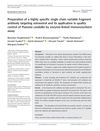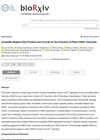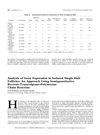 33 citations,
February 2016 in “Journal of Experimental Botany”
33 citations,
February 2016 in “Journal of Experimental Botany” ROOT HAIR SPECIFIC 10 (RHS10) reduces the length of root hairs in Arabidopsis plants.
[object Object]  24 citations,
March 2010 in “Value in Health”
24 citations,
March 2010 in “Value in Health” The PCOS-specific questionnaire needs more work to fully measure quality of life in clinical trials.
 6 citations,
March 2011 in “Experimental Dermatology”
6 citations,
March 2011 in “Experimental Dermatology” Too much or too little selenium in the diet can cause hair loss and graying in mice.
 5 citations,
April 2019 in “Phytochemical Analysis”
5 citations,
April 2019 in “Phytochemical Analysis” The new ELISA method is reliable and eco-friendly for checking the quality of Pueraria candollei.
 1 citations,
May 2023 in “Journal of molecular evolution”
1 citations,
May 2023 in “Journal of molecular evolution” Pangolins have lost some skin-related genes, but kept others, leading to their unique scales and skin features.
 January 2024 in “Journal of Hard Tissue Biology”
January 2024 in “Journal of Hard Tissue Biology” A high-fat diet may weaken tongue structure by reducing certain protein genes.
 January 2020 in “Veterinary world/Veterinary World”
January 2020 in “Veterinary world/Veterinary World” The natural topical treatment improved rabbits' skin and hair condition.
 April 2012 in “The Journal of Urology”
April 2012 in “The Journal of Urology” Eating more omega-3 and less omega-6 fatty acids may lower the risk of developing prostate cancer.
 15 citations,
December 2013
15 citations,
December 2013 Men with more vanadium in their blood and who drink less soy milk are more likely to have hair loss.
 11 citations,
June 2012 in “Archives of Dermatological Research”
11 citations,
June 2012 in “Archives of Dermatological Research” L-cystine and vitamin B6 at high doses prevented hair loss in mice treated with a chemotherapy drug.
 6 citations,
February 2019 in “Scientific reports”
6 citations,
February 2019 in “Scientific reports” A brain-produced steroid causes increased scratching in mice with a skin condition similar to eczema.
 April 2019 in “Journal of Investigative Dermatology”
April 2019 in “Journal of Investigative Dermatology” Sandalore®, a synthetic scent, improved hair loss and satisfaction in women with telogen effluvium.
 218 citations,
October 2013 in “Proceedings of the National Academy of Sciences of the United States of America”
218 citations,
October 2013 in “Proceedings of the National Academy of Sciences of the United States of America” Mice lacking the PPARγ gene in their fat cells had almost no fat tissue, severe metabolic problems, and abnormal development of other fat-related tissues.
 49 citations,
January 1994 in “The Journal of Steroid Biochemistry and Molecular Biology”
49 citations,
January 1994 in “The Journal of Steroid Biochemistry and Molecular Biology” RU 58841 may treat acne, hair loss, and excessive hair growth.
 4 citations,
July 2013 in “Journal of Dermatological Science”
4 citations,
July 2013 in “Journal of Dermatological Science” Pregnancy right after giving birth in mice lacking IL-10 causes milk that leads to liver issues and hair loss in their babies.
 1 citations,
October 2017 in “Food Additives & Contaminants: Part A”
1 citations,
October 2017 in “Food Additives & Contaminants: Part A” A new minoxidil-like substance, triaminodil, was found in an illegal hair growth supplement.

North American ginseng extract helped regrow hair in balding mice.
 28 citations,
November 2019 in “Frontiers in Endocrinology”
28 citations,
November 2019 in “Frontiers in Endocrinology” Vegetarian Indian women with PCOS have higher inflammation levels than non-vegetarians.
 27 citations,
October 1945 in “Endocrinology”
27 citations,
October 1945 in “Endocrinology” Synthetic hormone treatment reduces melanin and hair growth in rats.
 4 citations,
December 2020 in “Mammalian genome”
4 citations,
December 2020 in “Mammalian genome” Harlequin mutant mice have hair loss due to low AIF protein levels and retroviral element activity.
32 citations,
January 2016 in “Development” Sebaceous lipids are crucial for keeping skin and eyes healthy in mice.
56 citations,
April 2019 in “The Plant Journal” Cyclic nucleotide-gated channels are crucial for proper root hair growth and calcium balance in plants.
 January 2025 in “bioRxiv (Cold Spring Harbor Laboratory)”
January 2025 in “bioRxiv (Cold Spring Harbor Laboratory)” Armadillo Repeat Only proteins are essential for proper plant growth and response by regulating calcium channels.
 40 citations,
June 2011 in “Journal of biological chemistry/The Journal of biological chemistry”
40 citations,
June 2011 in “Journal of biological chemistry/The Journal of biological chemistry” FA2H is essential for normal fur and sebum production in mice.
14 citations,
February 2009 in “PLoS ONE” Keratinocytes help manage skin nitrogen metabolism, varying by age and skin area.
 May 2024 in “Food bioscience”
May 2024 in “Food bioscience” Wood sterol may help reduce hair loss caused by a high-fat diet.
 February 2024 in “Curēus”
February 2024 in “Curēus” A balanced diet with proteins, vitamins, and minerals is crucial for managing skin disorders.
[object Object]  May 1995 in “Journal of Investigative Dermatology”
May 1995 in “Journal of Investigative Dermatology” Researchers developed a new way to measure gene activity in single hair follicles and found that a specific gene's activity changes with different amounts and times of treatment.
 231 citations,
July 2008 in “Nutrition reviews”
231 citations,
July 2008 in “Nutrition reviews” Diet changes can protect against harmful environmental effects on fetal development.
51 citations,
August 2012 in “Differentiation” Mouse genital development depends on male or female hormones for specific features.


























